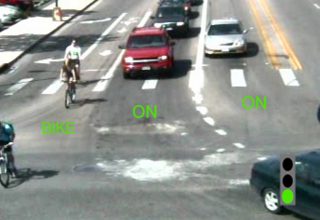
(Image: Econolite)
We’ve been writing for a few months about Portland’s application for $40 million in federal funds that could make it easier to combine services like bike sharing, TriMet, Lyft and so on into a single system of multimodal mobility.
But we haven’t been talking much about another important aspect of Portland’s grant: millions of dollars for connecting vehicles to improve safety.
As city leaders prepare for a personal pitch on Wednesday to U.S. Transportation Secretary Anthony Foxx, the Portland Bureau of Transportation held a “Connected City Expo” Monday to show off many of the companies that could be bringing their knowhow to a Smart City award here in Portland.
It gave us a chance to learn more about the new technologies that could be making streets safer soon, with or without the federal grant for which Portland is one of seven finalists.
Better signal detection
With new equipment, the inductive detector loops the city currently uses to know whether you’re at or approaching a stoplight on your bicycle could become unnecessary.
New local broadcast equipment and sensors “can track you all the way down the street,” said Mike McIntee, director of western sales for traffic-signal firm Econolite Group. That’s in contrast to inductive loops, which “can track you at a certain place and time in the roadway, but not all the way.”
In the short run, this application of Econolite technology would depend on people downloading a mobile app that would presumably help them trigger green lights while on a bike. (It might also help them broadcast their location to nearby connected vehicles.) There’s also a possibility that traffic signals could one day harvest information from passing vehicles about the fact that they have recently passed someone biking or walking, and adjust accordingly.
Jeff Wolf, Econoline’s district sales manager for the Portland area, added that the signals will be able to talk to buses about how many passengers are on board and give them greater green-light priority if they have more than a certain number of people on board.
Advertisement
Better blind-spot alerts
TriMet has been experimenting for years with buses that give audible warnings to people walking that a bus is turning left. Technology from the Israeli company Mobileye, developed as part of the race to build self-driving cars, could be used to alert operators of buses, trucks or trains that someone is in their blind spot.
The previous generation of safety systems was “warning the pedestrian,” said Adrian Pearmine of DKS Associates, a city consultant preparing the Smart Cities application. “This is warning the driver.”
Another benefit of this technology: it’s able to automatically log close calls with people walking or biking. If a particular intersection or corner is causing repeated near misses, TriMet or another agency might be able to identify a street design problem before it kills someone.
Less sudden truck braking
Trucks are heavy. When they get a red light signal while moving quickly, their drivers have to brake fast — or, sometimes, decide to blow a red or yellow light.
Advanced traffic signals that know where a truck is before it reaches them might be able to give that truck a few seconds more of green time to prevent that situation.
There are a lot of disparate parts of the city’s application — it may also loop in the concept of a small self-driving transit vehicle in the Portland International Airport area — but talking to Pearmine today, I had a sense for the first time that all these ideas might be coming together.
“I like our chances,” Pearmine said as I left Monday’s expo.
The city’s full proposal is due next week, and Foxx’s office will choose a winner next month. If Pearmine is right, Portland streets could be safer as a result.
— Michael Andersen, (503) 333-7824 – michael@bikeportland.org
Our work is supported by subscribers. Please become one today.


